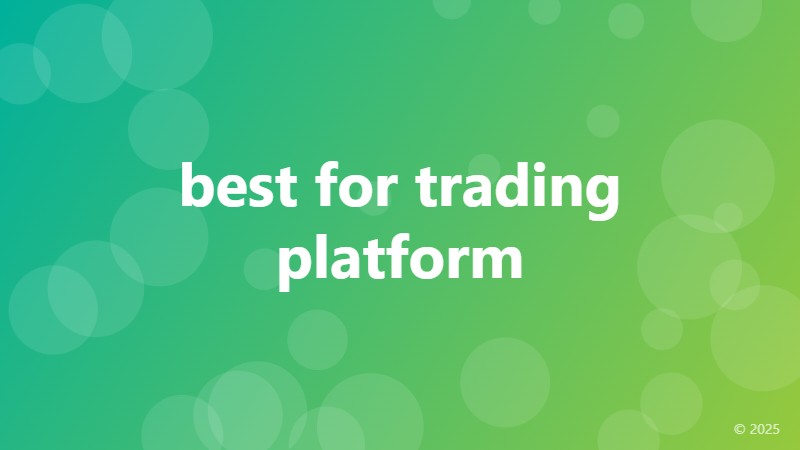best for trading platform

What Makes a Trading Platform the Best?
When it comes to trading, having the right platform can make all the difference. With so many options available, it can be overwhelming to choose the best one for your needs. But what exactly makes a trading platform stand out from the rest? In this article, we'll explore the key features and factors to consider when searching for the best trading platform.
Security and Regulation
One of the most critical aspects of a trading platform is its security and regulation. You want to ensure that your personal and financial information is protected from cyber threats and that the platform is compliant with regulatory bodies. Look for platforms that are registered with reputable regulatory agencies, such as the Securities and Exchange Commission (SEC) in the US or the Financial Conduct Authority (FCA) in the UK. Additionally, opt for platforms that use robust encryption and two-factor authentication to safeguard your account.
User Experience and Interface
A user-friendly interface is essential for a seamless trading experience. The best trading platforms offer intuitive and customizable dashboards that allow you to navigate easily and access the tools you need quickly. Consider platforms with features like real-time market data, advanced charting tools, and mobile trading capabilities. A well-designed interface can help you make informed trading decisions and reduce the likelihood of errors.
Trading Fees and Commissions
Trading fees and commissions can eat into your profits, so it's crucial to choose a platform with competitive pricing. Compare the fees and commissions of different platforms and consider the types of trades you plan to make most frequently. Some platforms may offer discounts for high-volume traders or loyalty programs that can help reduce costs. Be sure to read the fine print and understand the fee structure before committing to a platform.
Market Access and Product Offerings
The best trading platforms offer access to a wide range of markets and products, including stocks, options, forex, and cryptocurrencies. Consider the types of assets you want to trade and ensure the platform provides the necessary access. Additionally, look for platforms that offer advanced order types, such as limit and stop-loss orders, to help you manage risk and maximize returns.
Customer Support and Education
Even the most experienced traders need support and guidance from time to time. Look for platforms that offer 24/7 customer support through multiple channels, such as phone, email, and live chat. Additionally, consider platforms that provide educational resources, such as webinars, tutorials, and market analysis, to help you improve your trading skills.
Conclusion
Choosing the best trading platform requires careful consideration of several key factors, including security, user experience, fees, market access, and customer support. By doing your research and prioritizing your needs, you can find a platform that helps you achieve your trading goals. Remember, the best trading platform is one that provides a seamless and profitable trading experience, so take your time and make an informed decision.